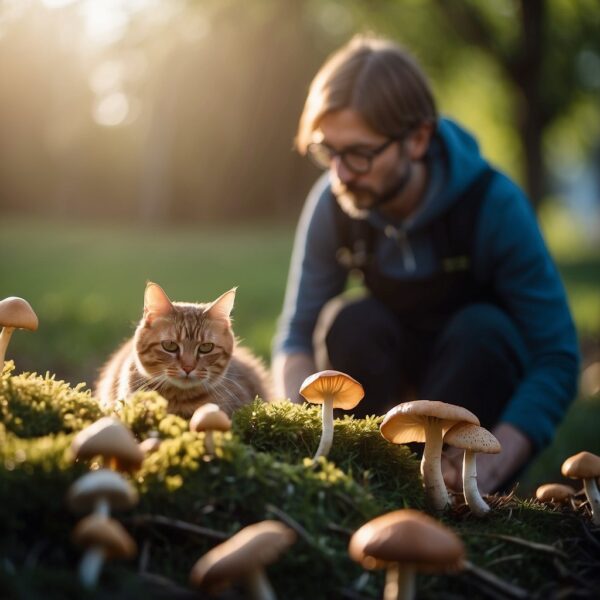
Can Cats Eat Mushrooms? Safety and Guidelines for Feline Diets
When considering the dietary safety of various foods for pets, the question of whether cats can eat mushrooms often arises. Mushrooms, as a diverse group, include varieties that can be both harmless and very toxic. Store-bought mushrooms are generally safe for cats to consume in small quantities and should be given as an occasional treat rather than a staple in their diet. However, it is crucial for cat parents to understand the potential risks and toxins present in wild mushrooms, which can vary broadly in their effects on cats.
The topic of mushrooms in a cat’s diet should be approached with a mixture of caution and understanding. While certain mushrooms can provide some nutritional value, they are not necessary for a cat’s health and should never replace specially formulated cat food. There’s also a need to recognize that just because a food is not toxic, it does not mean it is appropriate or beneficial for regular consumption by cats.
Key Takeaways
- Safe varieties of store-bought mushrooms can be given to cats in moderation.
- Wild mushrooms pose a risk of toxicity and should be avoided.
- Mushrooms are not a necessary part of a cat’s diet and should only be an occasional treat.
Overview of Cats and Mushrooms
In contemplating the dietary intersections between cats and mushrooms, it’s imperative to consider the carnivorous nature of felines, the nutritional components of mushrooms, their potential health benefits when introduced to a cat’s diet, and the risks associated with varying mushroom types.
Cats as Carnivores
Cats are obligate carnivores, which means their diets must predominantly consist of meat. They rely on a meat-based diet to fulfill their nutritional needs, including essential amino acids like taurine, which are not found in plant-based food. Protein from animal sources is vital for their energy, growth, and overall health.
Nutritional Profile of Mushrooms
Mushrooms are a low-calorie food rich in vitamins (such as B vitamins) and minerals but they lack the high-protein content that cats fundamentally need. Glutamate, an amino acid in mushrooms, offers a savory flavor that cats can appreciate, although this does not make mushrooms a necessary part of their diet.
Potential Health Benefits of Mushrooms for Cats
In moderation, certain cultivated mushrooms may provide health benefits to cats, such as supporting their immune system thanks to the antioxidants and vitamins present. However, they should only be offered as occasional treats rather than a staple in a cat’s diet.
Mushroom Varieties and Cat Diet Integration
- Cultivated Mushrooms: Store-bought mushrooms like white button, cremini, or shiitake can be safe for cats if cooked and unseasoned.
- Wild Mushrooms: It is crucial to avoid wild mushrooms entirely, as many varieties can be toxic or even lethal to cats.
Integrating mushrooms into a cat’s diet should be done with caution, always ensuring that any mushrooms served are safe and prepared without harmful additives.
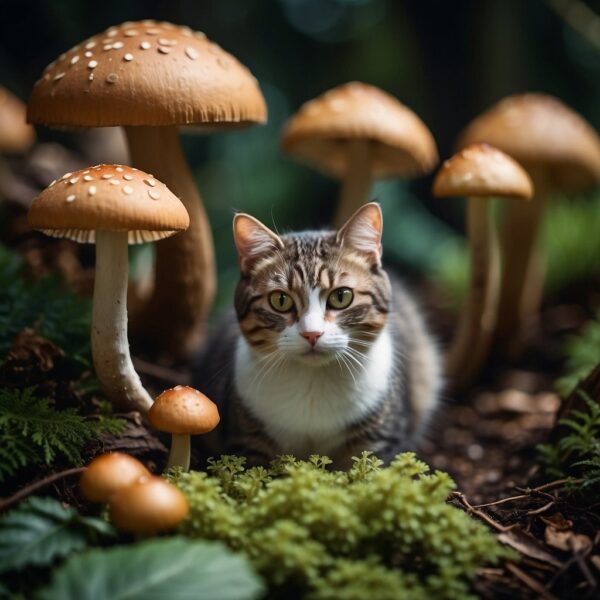
cats eating mushrooms safely
When considering mushrooms for cats, it’s crucial to know which varieties are safe, how to prepare them correctly, and the right amounts to feed. This ensures a cat’s safety and enjoyment when mushrooms are offered as a treat.
Identifying Safe Mushrooms for cats to eat
Safe mushrooms for cats typically include store-bought varieties such as the common button mushroom or portobello mushrooms. These mushrooms are deemed safe when purchased from reputable vendors where they have been cultivated for consumption. It is vital to avoid wild mushrooms, as they can contain toxins harmful to cats.
Safe Prep and Cooking Methods for cats to eat mushrooms
Proper preparation of mushrooms for cats is essential to avoid any potential health issues. Cooking mushrooms is recommended to enhance digestibility and to eliminate any residual bacteria. Simple methods such as steaming or boiling without any added seasonings or oils are the safest options.
- Steam: Steaming preserves a higher level of nutrients and is a hydration-friendly option.
- Boil: Boiling mushrooms is straightforward and eliminates the need for additional fats.
Appropriate Serving Sizes for cats eating mushrooms
Moderation is key when adding mushrooms to a cat’s diet. Mushrooms should only be an occasional treat and not a significant part of their diet. A small portion, such as one or two small cooked button mushrooms, is typically sufficient.
| Mushroom Type | Suggested Serving Size |
|---|---|
| Button mushroom | 1 small mushroom |
| Portobello mushroom | 1 small slice |
Introducing Mushrooms to a Cat’s Diet
When introducing mushrooms to a cat’s diet, it’s best to start with a tiny amount to assess their reaction. Ensure the mushrooms are cooked and cut into small, manageable pieces. Observing the cat’s response to the new treat is crucial to determining whether it is suitable for them.
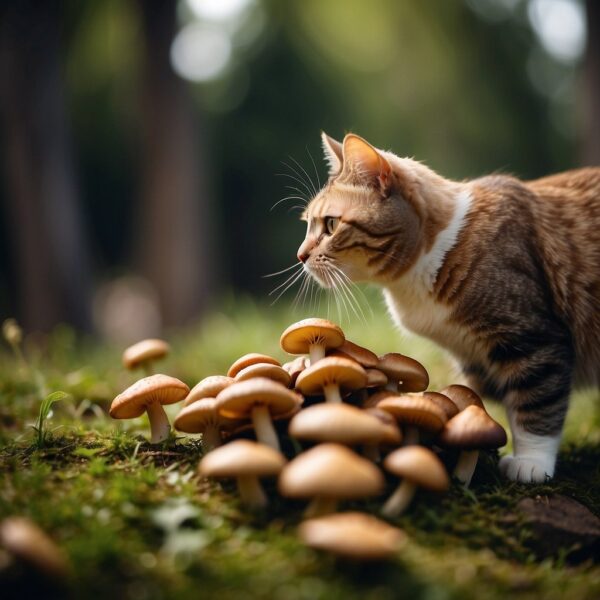
can cats eat mushrooms? toxicity and Risks
Cats are susceptible to mushroom toxicity, especially from wild mushrooms, which can cause symptoms ranging from gastrointestinal upset to severe organ damage. Accurate identification and prompt treatment are crucial for a cat’s recovery.
Common Toxic Mushrooms
Several wild mushrooms are highly toxic to cats and can cause severe symptoms or death. These include:
- Amanita phalloides (Death Cap Mushroom)
- Galerina marginata (Autumn Skullcap)
- Amanita muscaria and Amanita pantherina (Fly Agaric and Panther Cap), which contain psychoactive toxins that can cause hallucinations and neurological effects.
Symptoms of Mushroom Poisoning
Cats that eat toxic mushrooms may exhibit symptoms such as:
- Gastrointestinal distress: vomiting and diarrhea
- Neurological effects: agitation, depression, hallucinations, or seizures
- Muscarinic effects: excessive drooling, tear production, urination, or diarrhea
- Liver and kidney toxicity: which may progress to organ failure
These symptoms can develop within minutes to hours post-ingestion.
Treatment and Veterinarian Intervention
Treatment for mushroom poisoning in cats typically involves:
- Immediate veterinary care to induce vomiting if within a few hours of ingestion
- Activated charcoal administration to absorb toxins
- Supportive care, such as fluids to prevent dehydration
- Medications to control symptoms like seizures or vomiting
In severe cases, prolonged hospitalization and treatments such as liver support may be necessary.
Preventing Mushroom Poisoning in cats
To prevent mushroom poisoning, cat parents should:
- Remove all wild mushrooms from areas the cat can access
- Monitor cats’ outdoor activities to prevent ingestion
- Store any edible mushrooms or mushroom products safely out of reach
Being aware of the surroundings and controlling environmental risks is key in prevention.
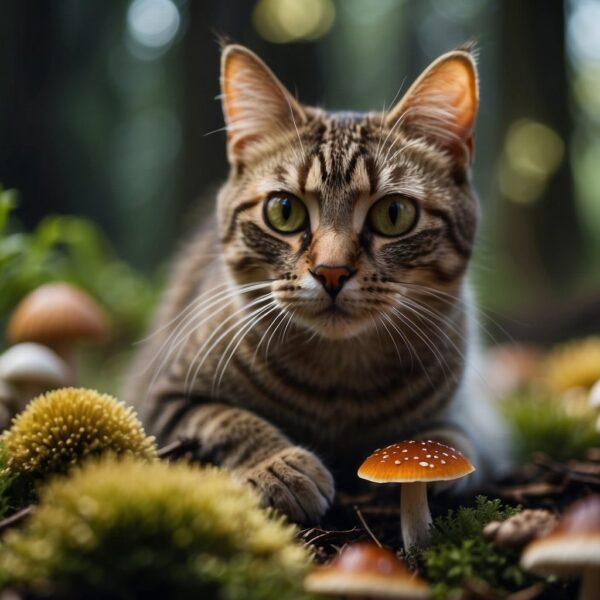
Nutritional Aspects and Allergies
When considering mushrooms as part of a cat’s diet, it’s essential to understand their nutritional contributions alongside the potential for allergies or food sensitivities.
Essential Nutrients and Compounds
Mushrooms contain B vitamins, such as riboflavin and niacin, which contribute to good health in cats. They also offer minerals like iron and antioxidants, including selenium. Some mushrooms have beta-glucans, known for supporting immune health, and provide a source of fiber. The presence of glutamate in mushrooms creates an umami flavor, which can be appealing to cats due to their natural preference for meat. However, despite these benefits, mushrooms are not a necessary part of a cat’s diet and should only be offered as an occasional treat since they lack sufficient protein and fatty acids crucial to feline health.
Allergies and Food Sensitivities
Cats may show sensitivity to mushrooms, manifesting as gastrointestinal or dermal symptoms. While rare, an allergic reaction can cause issues like itching, vomiting, or unsteadiness. Monitoring a cat after introducing mushrooms is crucial to identify any adverse reactions quickly.
cats eating mushrooms Myths and Misconceptions
In discussing whether cats can safely consume mushrooms, it’s crucial to dispel common myths and misconceptions. This section aims to clarify the facts about mushrooms as part of a cat’s diet, addressing specific fallacies about their safety and nutritional value.
Mushrooms as a Meat Substitute
Mushrooms are not a substitute for meat in a cat’s diet; they lack the necessary proteins and fats that cats require. While mushrooms can provide umami flavor, which cats might find appealing due to the presence of glutamate, they do not provide the full nutritional profile that meat does for a carnivorous diet.
cats and The Portobello Myth
The notion that portobello mushrooms are particularly beneficial for cats is misleading. While store-bought mushrooms like portobellos are typically safe for cats in small quantities, they should not be regarded as a dietary staple. Portobello mushrooms offer no unique health benefits to cats, and like all mushrooms, should be offered only as an occasional treat.
The Magic Mushroom Fallacy
Magic mushrooms or psilocybin mushrooms are extremely bad for cats and can lead to severe health issues, including nausea, changes in mood, and even liver toxicity. It is a dangerous misconception that they have any positive effects on a cat’s well-being or immune system. Ensuring that cats do not have access to these toxic fungi is paramount for their safety.
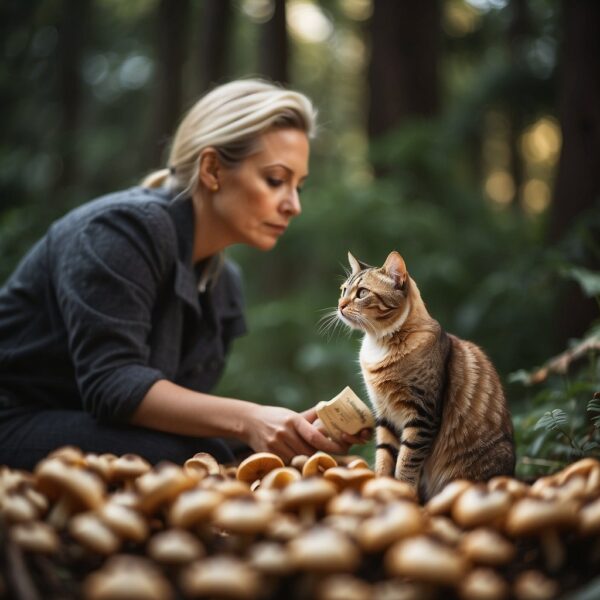
Frequently Asked Questions
Mushroom consumption can offer a unique set of risks and considerations for cats. This section answers common questions regarding the safety and implications of feline mushroom ingestion.
What are the risks of feeding raw mushrooms to cats?
Raw mushrooms can be toxic to cats, as certain varieties contain substances that may cause gastrointestinal upset or more severe health issues. Identifying non-toxic mushrooms can be difficult, so caution is advised.
Is it safe for cats to consume store-bought mushrooms?
While store-bought mushrooms are generally considered safe for human consumption, they may not be suitable for cats. Some cats may experience digestive issues, and the potential benefits do not outweigh the risks present.
Can button mushrooms cause harm to cats if ingested?
Button mushrooms are typically non-toxic to cats. However, they should still be given in moderation to avoid any potential digestive discomfort.
What should I do if my cat ingests mushroom soup?
Mushroom soup often contains ingredients that can be harmful to cats, such as garlic and onions. If a cat ingests mushroom soup, monitoring for signs of toxicity and contacting a veterinarian is essential.
What are the potential effects on a cat that has eaten mushrooms off a pizza?
Mushrooms on pizza can lead to digestive upset in cats. Additionally, pizzas often contain harmful ingredients like onions and garlic, as well as high fat and sodium levels, which are not suitable for cats.
Why should cats avoid eating mushrooms and onions?
Cats should avoid mushrooms due to the difficulty in distinguishing between safe and toxic types. Onions are toxic to cats, causing oxidative damage to their red blood cells and leading to anemia or other serious health issues.